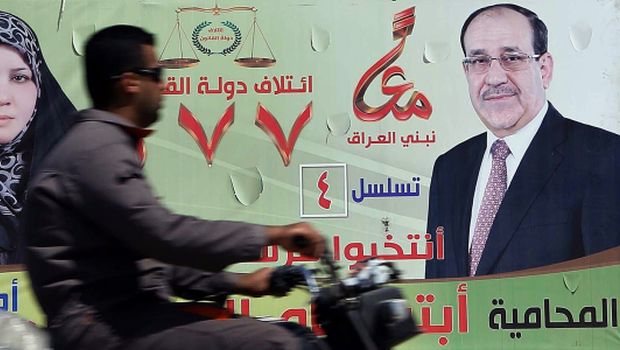
A man rides his motor bike past a large election campaign banner showing Iraqi Prime Minister Nuri Al-Maliki (R) along a street in the central Shiite Muslim shrine city of Karbala, on April 6, 2014. (AFP PHOTO/MOHAMMED SAWAF)
Moqtada Al-Sadr, the leader of the Shi’ite Sadrist Movement who announced his retirement from politics in February, returned to the political scene on Saturday in a meeting with the leader of the Islamic Supreme Council of Iraq (ISCI), Ammar Al-Hakim, aimed at coordinating the positions of the ISCI and Sadr’s Al-Ahrar bloc in the run up to the elections on April 30.
Analysts say Al-Ahrar is likely to win the backing of voters and politicians who have previously backed Maliki’s State of Law Coalition, the other leading Shi’ite bloc, partly because the founder of Maliki’s Al-Da’wah Party was Moqtada’s uncle, the revered Shi’ite cleric Mohammad Baqir Al-Sadr.
The meeting follows the Sadrists’ announcement of the nomination of an independent candidate for the position of prime minister, following agreements struck with the Kurdistan Alliance and the Sunni-led Mutahidoun bloc, which is led by parliamentary speaker Osama Al-Nujaifi.
Sadr contacted the president of the Kurdistan Regional Government (KRG), Massoud Barzani, by telephone on Sunday to discuss the same issues.
A statement issued by the KRG Presidency said: “The two sides discussed latest the developments in Iraq and the poor security situation, and expressed hopes that Iraq will be able to get out of this crisis as soon as possible.”
Meanwhile, a spokesman for Al-Ahrar, Jawad Al-Jubouri, told Asharq Al-Awsat: “Sadr . . . and Hakim did not discuss posts and positions, but we at the Sadr Movement and Al-Ahrar are totally convinced that change is a must, for reasons that are known to everyone.”
Ali Al-Shallah, a leading figure in Maliki’s State of Law Coalition defended Maliki’s record in office to Asharq Al-Awsat, pointing to the withdrawal of US forces, his government’s efforts to combat militias, and its insistence on pursuing a firm line on retaining control of Iraq’s oil revenues and resources in response to attempts by the KRG to strike unilateral deals with Turkey.
“Iraq today faces dangerous military challenges and all branches of the military need a man like Maliki in charge,” Shallah said.
